Credit rating – the foundation for enhancing reputation and integration capacity In his opening speech, Mr. Nguyen Quoc Hung, Vice President and General Secretary of the Vietnam Banks Association, assessed that credit rating plays an important role in fulfilling financial obligations to countries, organizations, and businesses in
the world in general and Vietnam in particular. In the banking sector, credit rating is considered an important “financial passport”, reflecting the financial capacity, management quality and reliability of credit institutions in the domestic and international markets.
 |
| Mr. Nguyen Quoc Hung, Vice Chairman and General Secretary of the Vietnam Banks Association, emphasized that credit rating is considered a "financial passport" for international integration of credit institutions. |
According to the Vietnam Banks Association, more and more commercial banks are proactively cooperating with prestigious international credit rating organizations. The results show that the financial capacity, risk management, capital safety and asset quality of the Vietnamese banking system have all improved significantly, thereby strengthening the confidence of the market and investors. "This 'financial passport' is not only an indicator to help access capital sources at reasonable costs, but also demonstrates transparency and is a measure of the readiness and integration capacity of the national banking system," Mr. Nguyen Quoc Hung emphasized, adding that many Vietnamese commercial banks have proactively conducted credit ratings with reputable credit rating organizations. The results show that the credit capacity of Vietnamese banks has made significant progress, thereby improving asset quality, capital safety, profitability and risk management. This is an encouraging signal showing the internal capacity and financial transparency of the Vietnamese banking system. This is also an important tool that not only helps investors identify the risk level of the issuer, but also supports credit institutions in self-assessing their financial position, strengthening market confidence and reducing capital mobilization costs.
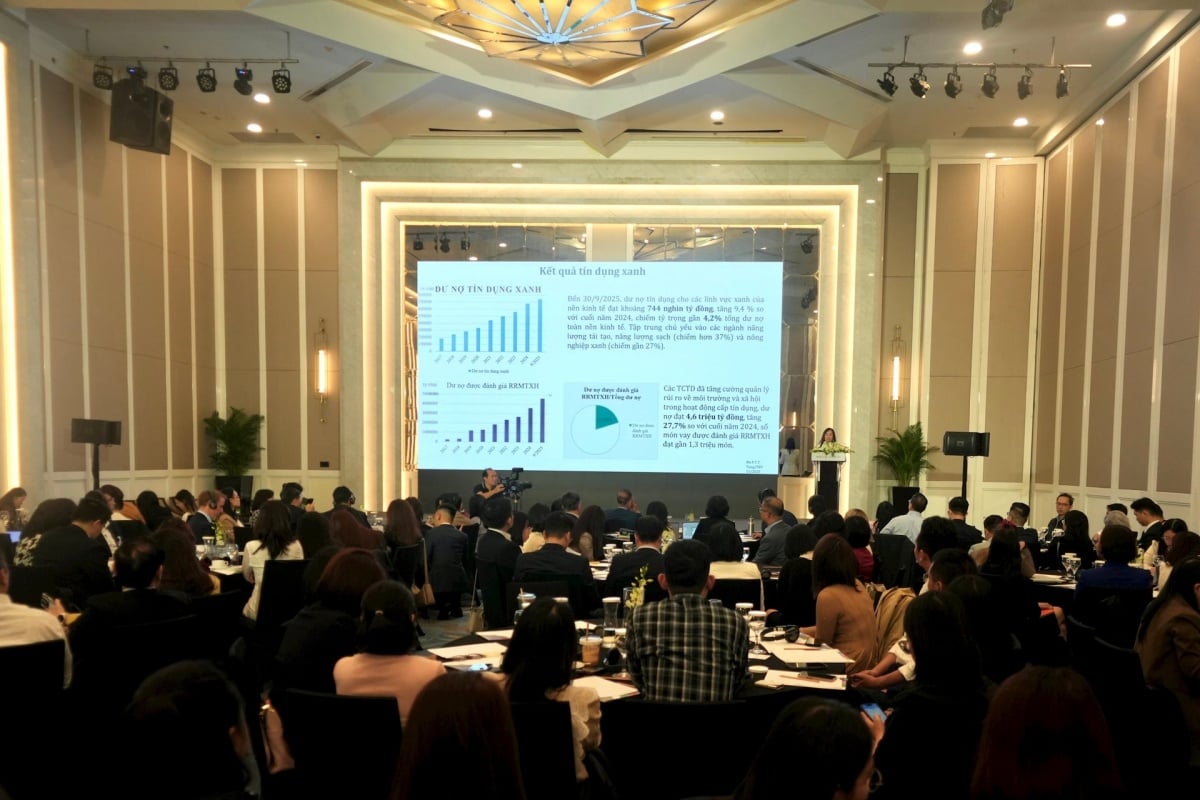 |
| Forum View |
In recent years, many Vietnamese commercial banks have proactively participated in credit ratings with prestigious international organizations. Fitch Ratings noted that the Vietnamese banking system has tripled in size compared to 2014, while significantly improving its governance capacity and capital adequacy. Mr. Willie Tanoto, Senior Director, Head of Southeast Asia Bank Ratings at Fitch Ratings, commented that Vietnam is attracting great attention from international organizations thanks to its outstanding
economic development, high GDP growth rate and much room for expansion. Currently, Vietnam's credit rating is only 1 level away from "BBB", reflecting the increasing confidence of international investors. Vietnam's financial environment is increasingly open, many policies on bank bond issuance have been issued in the past 10 years, along with strong improvements in the legal framework from the Government and the State Bank, creating a foundation for sustainable development. Fitch Ratings noted that most Vietnamese banks have focused on improving governance, increasing financial transparency and public listing, thereby strengthening market confidence. Over the past 10 years, the banking system has maintained a positive credit growth rate, along with a marked improvement in asset quality. and the outlook for asset quality has been raised to positive. However, Fitch also noted that rapid growth means new risks. “We have the right to be optimistic about the prospects of the Vietnamese banking industry, but we need to be well prepared to respond to the risks arising from this strong growth rate,” said Mr. Tanoto.
 |
| Ms. Pham Thi Thanh Tung - Deputy Director of the Department of Credit for Economic Sectors of the State Bank of Vietnam said that recently, the State Bank of Vietnam has implemented many solutions to promote green credit. |
Sharing the same view, Mr. Andre Debakhapouve, Director of
VPBank Risk Management, also commented that compared to other markets, Vietnam has a high growth rate and is an emerging economy, so along with opportunities there are many risks that need to be managed. To manage risks well, the Director of VPBank Risk Management noted that banks need to build a risk management culture, early identify new risks such as: cyber security, artificial intelligence, non-financial risks, etc. to have preventive measures, clearly classify risk groups for appropriate management. According to Mr. Andre, Vietnam is on the right track when it proactively builds a backup buffer and strengthens the capacity of a young, dynamic risk management team. He highly appreciates Vietnam's political stability and clear legal framework - factors that help the banking system operate in a safer environment than many other emerging economies.
Green finance and ESG – the strategic direction of the Vietnamese banking industry Along with improving credit capacity, developing green finance and ESG is becoming a strategic pillar in the long-term orientation of the Vietnamese banking industry. Mr. Nguyen Quoc Hung said that in the context of increasingly severe climate change, banks have the role of "directing capital flows", leading capital into green, energy-saving and environmentally friendly projects, contributing to the implementation of the commitment to net zero emissions by 2050. The commitment to achieve net zero emissions by 2050 requires the urgent need to form a green financial system to support businesses in transformation. From a state management perspective, Ms. Pham Thi Thanh Tung, Deputy Director of the Department of Credit for Economic Sectors (SBV), said that in recent times, the SBV has implemented many solutions to promote green credit. Accordingly, the State Bank has managed credit to serve production and business, focusing credit on priority areas, economic growth drivers, and supporting the economy to shift to a green and sustainable growth model.
 |
| Mr. Amit Ganju, General Director of Corporate Development Asia - Pacific, Fitch Ratings |
Along with building the orientation for green banking and green credit development
, the State Bank also issued an action plan for the banking sector to implement the National Strategy on green growth, issued documents guiding green credit, linked to the goal of environmental protection, implementing green credit programs in a number of industries and fields... The State Bank also actively exchanged and worked with organizations such as WB, ADB, AIIB, AFD, JBIC, foreign banks... to mobilize support resources from these organizations for green growth and sustainable development; coordinated with ministries and branches to issue letters of no objection to loans from a number of international financial organizations (IFC, AIIB,...) to finance green projects in Vietnam through the banking system. On the other hand, strengthening the capacity of the banking system in implementing green credit through the implementation of technical support activities, training activities and fostering knowledge, management and operational skills to improve the quality of banking human resources in credit and green banking. With the synchronous implementation of these solutions, the Deputy Director of the Department of Credit for Economic Sectors said that by September 30, 2025, the outstanding green credit balance will reach VND 744 trillion, an increase of 9.4% compared to the end of 2024, accounting for nearly 4.2% of the total outstanding debt of the economy. Outstanding green credit balance is mainly focused on renewable energy, clean energy (accounting for more than 37%) and green
agriculture (accounting for nearly 27%). Credit institutions have strengthened the management of environmental and social risks in credit granting activities, outstanding loans reached 4.6 million billion VND, an increase of 27.7% compared to the end of 2024, the number of loans assessed for environmental and social risks reached nearly 1.3 million. However, the representative of the State Bank also frankly pointed out institutional and technical barriers. Although Vietnam has a Green Classification List (Decision 21/2025/QD-TTg), there is no green project certification process, and there is a lack of a specific criteria framework for circular and ESG projects. The green bond market and sustainable finance are still limited, ESG data has not been shared uniformly among parties... Therefore, the representative of the State Bank recommended to soon complete the guidelines for green project certification, develop the carbon market and the domestic green bond market, and support banks to access international capital at more reasonable costs.
 |
| Ms. Nguyen Thi Thu Ha, Deputy Head of ESG Steering Committee, Director of Agribank Staff Training School |
From the perspective of commercial banks, Ms. Nguyen Thi Thu Ha, Deputy Head of the ESG Steering Committee, Director of the
Agribank Staff Training School, said that Agribank has determined to make ESG a part of its development strategy, contributing to promoting a green, inclusive and sustainable economy. Participating in sustainable development activities helps banks both manage risks better and open up new opportunities. Agribank has built an environmental and social risk management system, deployed green credit products and supported environmentally friendly projects. According to Ms. Ha, ESG human resource training is an important foundation and requires a specialized, well-trained apparatus capable of measuring impacts and linking with the bank's overall strategy. However, Ms. Ha also pointed out that the current difficulty lies in the complicated application of ESG standards to the credit process; lack of detailed instructions and coordination between relevant parties. Therefore, it is necessary to have a support mechanism, share experiences and encourage international cooperation to improve the capacity of the whole industry. Sharing the same view, Ms. Candice Low, ESG Rating Director of Sustainable Fitch, said that Vietnam aims for 60% of banks to apply ESG plans, equivalent to the current level of Thailand. To achieve this goal, Vietnam needs a unified institutional framework, a strict risk management process and a team of experts who understand ESG - financial operations. "There can be no sustainable development without separating the human factor and professional knowledge," Ms. Candice Low emphasized. Experts at the Forum agreed that credit rating, risk management and ESG are three mutually supportive pillars, creating a solid foundation for the sustainable development of the banking system. Highly rated banks will be able to mobilize capital more cheaply; banks with good risk management will operate more stably; and banks that integrate ESG in their strategies will be more competitive in the long term. According to international experts, the Vietnamese banking industry is entering an important phase of transformation – maintaining growth while promoting transparency, “greening” operations and adapting to global risks. If Vietnam continues to steadfastly reform, perfect the ESG framework and raise governance standards, it is entirely possible for Vietnam to become a dynamic and responsible financial center in the region, where capital flows come for trust and sustainability, not just for profit.
Source: https://thoibaonganhang.vn/ngan-hang-viet-nam-cung-co-niem-tin-thi-truong-kien-tao-tai-chinh-ben-vung-173415.html









![[Photo] The "scars" of Da Nang's mountains and forests after storms and floods](https://vphoto.vietnam.vn/thumb/1200x675/vietnam/resource/IMAGE/2025/11/13/1762996564834_sl8-jpg.webp)







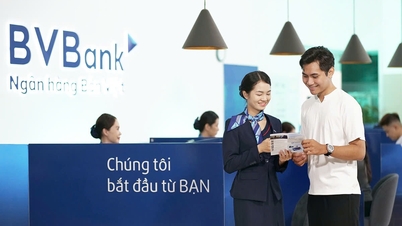









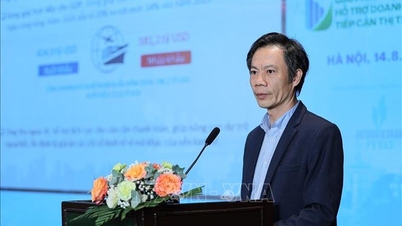


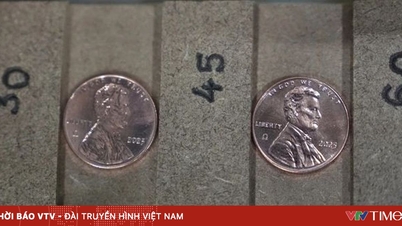






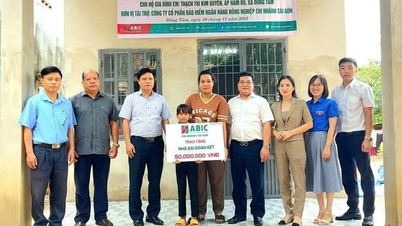

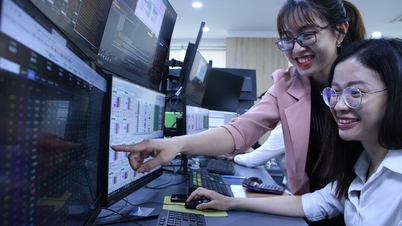


![[Photo] Prime Minister Pham Minh Chinh attends a conference to review one year of deploying forces to participate in protecting security and order at the grassroots level.](https://vphoto.vietnam.vn/thumb/1200x675/vietnam/resource/IMAGE/2025/11/12/1762957553775_dsc-2379-jpg.webp)













































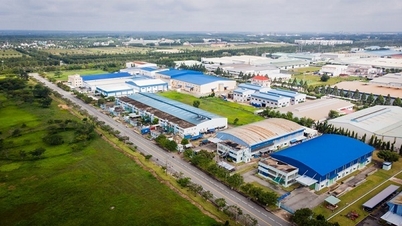




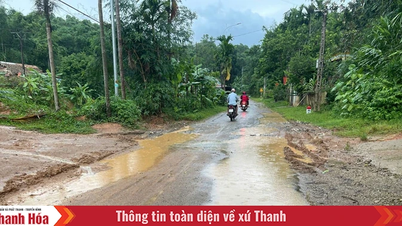





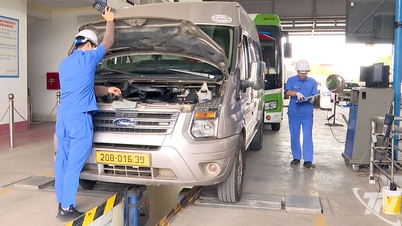




![Dong Nai OCOP transition: [Article 3] Linking tourism with OCOP product consumption](https://vphoto.vietnam.vn/thumb/402x226/vietnam/resource/IMAGE/2025/11/10/1762739199309_1324-2740-7_n-162543_981.jpeg)








Comment (0)